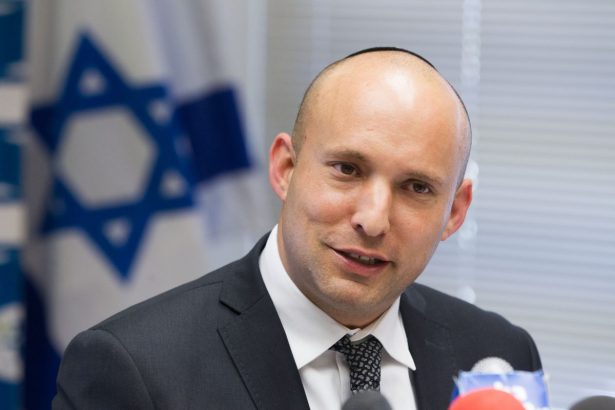‘Forming a Palestinian state along the lines that many readers of Fathom believe is the way forward would guarantee 200 years of misery for the two peoples’. That was the message from Naftali Bennett, the Israeli Minister for Education, leader of the Jewish Home party, and a highly influential member of Israel’s coalition government, when he sat down with Fathom Deputy Editor Calev Ben-Dor. Bennett also made the case for his own vision for peace, ‘The Stability Plan’ – Israeli sovereignty in Area C of the West Bank, limited Palestinian self-government in Areas A and B – and invited Europeans to stop looking at a very tough neighbourhood through the prism of ‘Oslo and cocktail parties’.
Calev Ben-Dor: In a speech on 7 May at the Jerusalem Post Conference in New York you said: ‘The left-wing doesn’t have a monopoly on peace, just like the right-wing doesn’t have a monopoly on patriotism. I am ready for negotiations without preconditions or pre-concessions.’ What is your vision of peace?
Naftali Bennett: I’ve been both fortunate and unfortunate to have fought in many conflicts since the First Intifada – in southern Lebanon, Operation Defensive Shield during the Second Intifada, the Second Lebanon War, and I served as a Cabinet minister during the last round of conflict in Gaza in 2014 – so I think I have a very good perspective of our situation. First and foremost I will do anything in my ability to prevent war. Israel has no territorial claims over Lebanon, Syria, or Iran but we’re in the toughest region on earth. On our northern border we have the most concentrated area of rockets in the region in the hands of Hezbollah (and second on earth after the North Korean-South Korean border). To the north-east we have Iranian militias setting up on our borders. In the south we have ISIS’s strongest foothold in the Sinai, and in the south-west we have a border with Hamas. On the other side of each of those four borders are people who explicitly say they want to destroy Israel and the Jewish people.
When I look 100 years into the future and think how a country the size of New Jersey can survive and thrive, one principle is the capacity to be able to ‘defend ourselves by ourselves’. Israel’s brief history has taught us that the international ‘peacekeeping’ forces are great until you need to use them. They evaporated in 1967 and they are meaningless in Lebanon and in Syria.
Secondly, history shows that land Israel hands over to Arabs usually turns into an Iranian military foothold. The reason the Israeli public has moved to the Right in recent years isn’t due to ideology but rather to reality. As a child in the 1980s we had peace songs on the radio and in kindergartens and the Israeli public was conditioned to love and believe in peace. Yet in the last elections the word peace was taboo – not because the parties and public don’t desire it, but rather because we came to understand – the hard way – that desiring peace sometimes brings about the opposite. Over 1,000 Israelis died in the terrorist attacks during the 2000s, after we pulled out of parts of Judea and Samaria in the Oslo framework. We pulled out of Lebanon in May 2000 with hopes for peace – as neither side has any territorial claims on the other – but we got the Second Lebanon War in 2006. We pulled out of Gaza and did everything we were expected to do – withdrew exactly to the former armistice lines, kicked out the Jewish settlers, took out the army, and handed over the keys to Palestinian Authority (PA) President Mahmoud Abbas – and what we’ve had since is an ‘Afghanistan,’ a Hamastan; rockets that have killed many, three rounds of wars and an insoluble situation.
When we take these examples, people here have absolutely zero appetite to turn over additional land of our small country – especially the heart of our country – to people who thereafter will turn it into an ‘Afghanistan’. No amount of words, paper, or schemes of bringing in drones or foreign peacekeeping forces will persuade us otherwise. I say to our friends who think they have these great technological solutions that do not require an Israeli presence on the ground to show us how it would work in Gaza first. Let’s try it for five years there and then we’ll talk after.
Essentially forming a Palestinian state along the lines that many of the readership of Fathom believe is the way forward would guarantee 200 years of misery for the two peoples.
The Stability Plan
That said, what do we do? I have no desire to occupy, govern and control the 2 million Arabs that live in Judea and Samaria. I remember what it was like during the First Intifada, and I don’t want to control their education, their sewage system and their quality of life. The main idea of The Stability Plan is to provide full civilian self-governance to the Palestinians so they can elect themselves, pay their taxes, and control those areas that are theirs. We should apply sovereignty in Israeli-controlled areas – known as Area C – and Palestinians living there will become part and parcel of the State of Israel. And since within the State of Israel you cannot have two levels of people, those Palestinians living in Area C – approximately 80,000 people – will be offered full Israeli citizenship, including voting rights. I think most will opt for residency rather than citizenship (like in East Jerusalem) but it’s up to them. They can be Israeli citizens, Israeli residents or Palestinian citizens.
Those living in the Palestinian-controlled areas (Areas A and B) will govern themselves in all aspects barring two elements: overall security responsibility and not being able to allow the return of decedents of Palestinians refugees. We can’t have an inflow of millions of great grandchildren of 1948 refugees coming across the Jordan River because in one swoop that would distort the demography of the area, and within a few weeks of their arrival, the local Palestinians in Judea and Samaria would tell them to ‘go back to Jaffa’ which would subsequently create pressure on Israel that could lead to a third intifada inside ‘Smaller Israel’.
My option is that Palestinians have an ‘autonomy on steroids,’ and I’m open to ideas about how this materialises; it could be a confederation with Jordan, or local municipalities, or a central government. It would encompass full freedom of movement, massive infrastructure investment, the creation of a tourism zone so Christians can enter Haifa, Nazareth, Nablus, Ramallah, Jerusalem and Hebron without going through road blocks. We would have joint industrial centres, and we’d be able to create a land port governed by the Palestinians in Jenin that would be connected to Haifa.
CB-D: On the assumption that no Palestinian leader would accept this, how would it be enforced? How would Israel respond to local opposition on the ground? There is also an international consensus around the paradigm of two states for two peoples. In the long term, how would Israel be able to deal with the international community and its likely response to your plan?
NB: Most of the actions to implement The Stability Plan don’t require cooperation. It’s a bottom-up economy-based peace solution and the Palestinians don’t accept any other options. Former Prime Minister Ehud Barak offered them a state and they refused.
All talk of two-state solution is generally on the diplomatic level and forgets the Israelis and Palestinians who want to improve their lives. My approach brings a much better horizon for Palestinians and Israelis because right now the only quiet place in the Middle East is in Judea and Samaria and it’s because we’re there.
I understand there is global consensus around the two-state solution, but what the world thinks is no proof for the correctness of a plan. The world gets it wrong a lot.
I’d say to those in the international community who are so entrenched in the idea of a Palestinian state that (a) the Palestinians have a state in Gaza and they blew it, and (b) after 50 years, at what time do we need to rethink? In the high tech world where I come from, if my employees tried the same solution and failed again and again I’d fire them as I’d expect them to have tried to tackle the challenge from a different angle by now! There is an industry around this topic – think-tanks, journals, professionals and academics who keep on chewing on the same old failed solution. We’re not in Europe, we live in a region with very few democracies, and when we tried this idea out it blew up in our faces and no one showed us any sympathy.
Second, the international community did not recognise Jerusalem as the capital of Israel, or the Golan Heights as ours, but I think everyone now realises that if we had handed over the Golan to Hafez al-Assad in the 1990s we would now have ISIS along the shore of the Sea of Galilee. International recognition may take 20, 50 or 80 years, but this has been our homeland for over 3,000 years and we have no other option. We have to stick to it, and have the strategic patience it takes.
I’m not suggesting we apply sovereignty to all of Area C overnight; it has to be gradual. But yes, we live here and we have to do what is right for us. Lately Israel is being increasingly seen as a source of stability and positive power in a region where there is a fear of Iranian domination. Israel has provided intelligence that has saved hundreds of lives in Europe. People often talk about the importance of boots on the ground, but we have eight million sets of boots on the ground in the heart of this difficult area.
CB-D: Do you feel The Stability Plan provides self-determination for the Palestinian population in the West Bank or is it more a case that while that might be a nice ideal, due to the security concerns Israel can’t afford to give what we want for ourselves?
NB: It’s unrealistic. Self-determination also depends on democracy so that the people are able to determine what they want. Almost none of neighbours enjoy democracy and if they did they would cease to be. So The Stability Plan is only partial self-determination but in the real world you have to make compromises. But as I said, Israeli Arabs and the Palestinians enjoy some of the best lives in the region.
We have a very large Arab minority in Israel who are thriving and enjoying full equal rights. There are MKs and Supreme Court justices of Arab origin. As Minister of Education I am responsible for hundreds of thousands of Arab kids who are perhaps the best educated Arabs in the whole region. I am investing massively in Maths, Science, English, and the story of Israeli Arabs is a very positive one. They aren’t Zionists (although some volunteer to the IDF), but they are happy and thriving.
CB-D: How would you respond to those who argue that your plan is basically a type of Swiss-cheese of Palestinian areas hemmed in by access roads, check points, and the IDF?
NB: No, my plan includes the freedom of movement. Every Arab in Judea and Samaria would be able to get in his or her car and drive freely to any other location without having to go through roadblocks. It’s all solvable if there is a desire – full freedom of movement; freedom of political organisations. They would choose their own governments (even though I’m fearful they’ll chose Hamas as they did in 2007 but that’s their decision). It is true that they won’t have an army and won’t be able to flood us with millions of descendants of refugees, who instead will need to be naturalised in the countries they currently live. (Just as Israel resettled over 800,000 Jews who were expelled from Arab countries between 1948 and 1967).
I am very optimistic. When you look at the world through Oslo and cocktail parties the world looks dire. But I spend a lot of time on ground, my family lives here and I see the quality of life for Israeli Arabs when I visit their schools, and for Palestinians, and the actual picture is a very good picture. It could be much better if we focus on making lives better from the bottom-up.






































Bennett’s opening tirade, blaming the indigenous Palestinians for every Israeli ill, is shameful. He then uses this to form the basis of his refusal to accept what is rightful and legally correct : the establishment of the state of Palestine based on the pre 1967 lines free from Israeli control
What the “stability plan” offers is an extension and consolidation of the apartheid system already in existence in the West Bank : nothing more and nothing less. Bennett’s efforts to buy off the Palestinian resistence with dreams of economic benefits is despicable especially as they have the legal right to decide their own economic and political future, free of Israeli control.
What irks most about this plan, however, is that it rides roughshod over international law. All of the West Bank legally belongs to the indigenous Palestinians and self-determination (not “partial self-determination” ) has been recognised by Israel as a Palestinian right. Consequently, if this plan were to be implemented we would have “200 years of misery for the two peoples.”
in response to Jonathan Gray’s comment, it is worth noting that the Jews are actually the indigenous people, and the Palestinian Arabs are the colonizers.
This sort of ignorance of basic history is shared by many in the west, unfortunately.
A Two Citizenships Solution vs. a Jewish-Arab State >>
The number of Arabs and Jews living west of the Jordan River is approximately the same.
Arab autonomy in Palestine exists for more than 20 years, on the territory of the Gaza Strip and in areas A and B.
All Jews were expelled from there long ago.
A two states solution is meaningless without changing citizenship of Israeli Arabs.
Israeli Arabs obtained Israeli citizenship illegally and against international law.
In 1952, Jews rashly presented the Arabs with Israeli citizenship.
Unfortunately, Israel long ago became a bi-national , it’s an incubator for Arab people.
Arabs hate Jewish state. This can lead to events such as those that occur in Syria.
Jews will not survive in a bi-national state.
Israel must stop to impose Israeli citizenship to the hostile nation.
Immediately after the establishment of a new Arab state west of the Jordan River ( or return Jordanian rule ), the Arabs of Haifa, Nazareth, Lod, Galilee, Negev, Jerusalem etc. must become citizens of their new (old) state.
If the Jews do not want to continue to live in a bi-national state, and within a generation become a minority in Israel, they must prepare for a referendum (as in Scotland) based on the UN resolution to divide Palestine for Jews and Arabs.
Fatah-Hamas government requires land free of Jews.
Therefore, Israeli demands are legitimate and forced:
1. To divide National Insurance for Jews and Arabs, by forming the funds from taxes collected separately from Jews and Arabs.
2. To employ only the Arabs, who will replace Israeli citizenship to the status of Israel’s residents.
3. Deductions from wages ( income tax and health tax) of Arab residents to transfer to the Palestinian Authority , of course along with responsibility for health, education , jobs and pensions to all Arabs who wish to remain in Israel.
It’s possible to separate from the Arabs according to law, as the Irish and the British, as the Czechs and the Slovaks or as the Greeks and the Turks in Cyprus . First to separate economically and then geographically.
Palestinian-Jordanian citizenship to the Arabs, Israeli citizenship to the Jews.
Two Nations – Two States – Two Citizenships !
The only sustainable long term solution is:
The Arabs should be ruled by the Arab administration and the Jews should be governed by the Jewish government.
Rather than having Jonathan Gray read between the lines and determine what is ‘rightful and legally correct’, I would rather read something from someone on the ground who can comment on how well or poorly this plan would work and why.
In response to AR :
The British during the Mandate clearly defined who qualified as indigenous and did so in such a way that it was totally biased in favour of the Zionists/Jews. They held two census and both times the Palestinian Muslims were the majority and the Palestinian Jews/Zionists were a minority. Consequently, your first sentence is erroneous.
In response to Lewis Lorton :
The “plan” will not work out “well” and will be worse than “poorly” because the proposal is in violation of international law. The proposal by Bennett will leave one side, the indigenous Palestinians, with a deep rooted feeling of having been victimised. This emotion and continuation of victimisation will only lead to revanchism and will sooner or later end in a rekindling of the conflict.
The Palestinians are rightfully and legally entitled to all of the West Bank territory, which includes East Jerusalem, taken in the war of 1967.
Jonathan Gray:
“The British during the Mandate clearly defined who qualified as indigenous…”
Martinez-Cobo created one of the few generally accepted definitions of who is indigenous. That is to say it is accepted as principles to apply everywhere to ascertain who is indigenous, not as a tool by which to say that those we like are indigenous and those we like are not, the way those you cite do with the Palestinians. The items Martinez-Cobo listed include:
Occupation of ancestral lands
Common ancestry with the original inhabitants
Culture
Language
Religion that places importance on spiritual ties to ancestral lands
The Jews meet those criteria. They are the only people recorded to have been living there since the return under King Cyrus of Persia. Indigeneity is never lost by being in exile from one’s ancestral land.
On the other side, the Arabs came as conquerors in the 7th century. A substantial portion of those claiming to be Palestinian came substantially later than that, many of them either in the 19th century or after World War I. Everything of their language and culture comes from outside of the territory.
No amount of time or number of generations dwelling in a conquered can turn the conquerors into the indigenous people. To claim otherwise would undermine all other indigenous peoples. Would you say that in 20 generations that the Han settlers would be the indigenous people of Tibet? By what principle could you say that the Palestinians are, but the 20th generation descendants of today’s Han settlers of Tibet will not be?
In reply to : SCOTT SMITH
I used the Britiish definition because that relates to the period that I was writing about. It would be erroneous of me to use a definition that developed over 50 years later to apply to an earlier event. The British used this to decide who were the majority peoples of the land. Both times the results of the census clearly showed that the Palestinian Muslims were in a majority. Consequently, according to the Mandate, they were to prepare them for self-determination; in other words the state of Palestine in which the Jews were to have a homeland.
“I used the Britiish definition …”
What definition? The British simply stated that the Arabs were indigenous based on simple intuition. If you accept whatever process the British used to reach that conclusion, the in 20 generations, the descendants of today’s Han settlers will be indigenous to Tibet and the Tibetan will not be. Do you believe that that is how it should be? If not, why should the Palestinians be accorded different treatment.
As to dispossessing them of their homeland, at the time of the British Mandate, the Arabs saw all of what became Israel, Jordan, Syria, and Lebanon as simply part of Syria. In fact, the first use of the term “Nakba” was used to refer to separating of the northern and southern parts of Syria between two different League of Nations mandates. Even if you include all what “should” be Palestine in Israel, the Arabs wound up losing 28,000 sq. km. of 312,000 sq. km. of the Levant. Is that an unreasonable amount?
This is not to say that civil rights should not be afforded to the Arabs of the southwest Levant. However, a resident of Nablus has no more attachment to Maale Efraim than to Zarqa or to Damascus, and the division of land should take that into account.
In reply to : Scott Smith.
You have missed the point of what I wrote. One has to view the situation as it unfolded during the Mandate period, if not, one would be perverting what actually happened at that time.
Why do you imply that I wrote about “dispossessing them of their homeland” ?
Furthermore, I am afraid what follows that, in relation to my original comment, went right over my head.